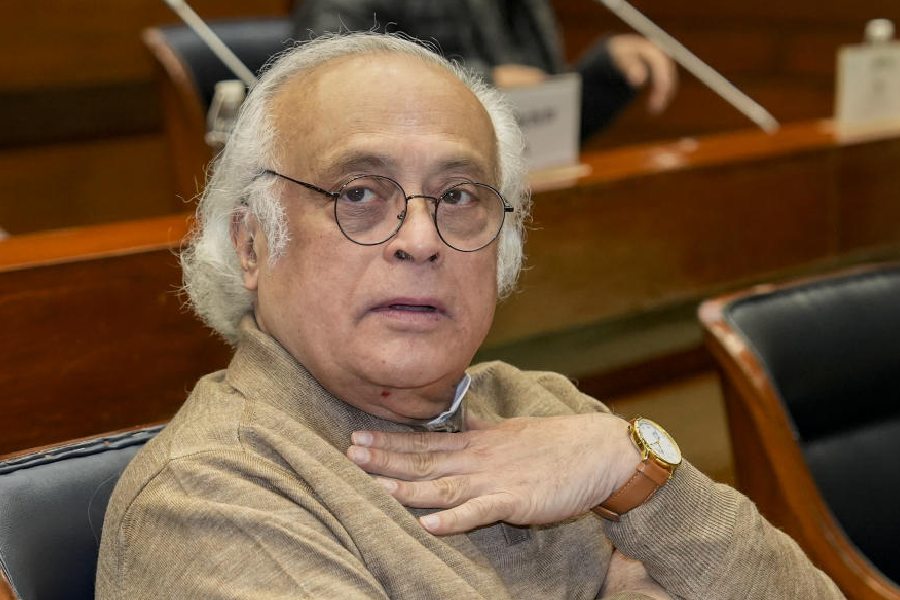The NCERT has given Hindi titles to many of its new English-medium textbooks, including books on the study of the English language, attracting charges of promoting “Hindi colonialism”.
The controversy comes at a time when the Tamil Nadu government is battling the Centre’s three-language policy for schools, calling it an underhand attempt to impose Hindi on non-Hindi-speaking states.
So far, the NCERT’s language studies books always carried titles in the same language.
For example, the old Class VI and VII textbooks for English were titled Honeysuckle and Honeycomb, respectively, till last year. The title of the new English-language textbooks for both classes is Poorvi, a Hindi word meaning “eastern” and also the name of a raga in Hindustani classical music.
The English-language textbooks for Classes I and II have been renamed as Mridang, and those for Classes III and IV as Santoor. Both are names of musical instruments.
For subjects such as mathematics, science, social science, art, physical education and vocational education, the apex textbook-preparing body published its books in English, Hindi and Urdu versions.
A retired NCERT professor said these books traditionally carried titles in English, Hindi and Urdu, matching the language in which they had been published.
For example, the previous mathematics book for Class VI came with the title Mathematics for the English version, Ganit for the Hindi version and Riyazi for the Urdu version.
Last year, however, the NCERT changed the title to Ganita Prakash for both the Hindi and English versions.
“The NCERT has changed the tradition. It’s not clear what they want to achieve,” the retired professor said.
The foreword to the Class VI English-language textbook, written by NCERT director Dinesh Prasad Saklani, and an introductory section titled “About The Book” by academic coordinator Kirti Kapur, are silent on why it carries the Hindi title Poorvi.
“Poorvi also weaves into its contents snippets from the vast treasure trove of Indian Knowledge Systems, India’s artistic and cultural heritage, and embeds values alongside ecological sensitivity, gender equality, digital skills, etc,” the foreword says.
Some English-medium books have been spared the Hindi onslaught, though.
The English version of the new science book for Class VI, earlier called Science, has been given the new English title of Curiosity while the Hindi and Urdu versions are titled Jigyasa and Tajassus.
The English version of the new social science textbook for Class VI comes with the title Exploring Society: India and Beyond while the Hindi version is titled Samaj Ka Adhyayan: Bharat aur Uske Aage.
Apoorvanand, a Delhi University history professor who was a member of the NCERT’s textbook development team in 2006, questioned the practice of giving Hindi titles to books written in the English language.
“This is Hindi colonialism. The NCERT is doing it in a vulgar way,” he said. “Tamil Nadu has been proved right by the way the NCERT is giving the titles. It is introducing Hindi to non-Hindi speakers in a cunning way.”
Anvita Abbi, a retired professor of linguistics from JNU, said: “The title of a book should be appropriate to the content. Titles like Poorvi or Santoor do not say anything about the content, and are hence misleading.”
She added: “Also, when the medium of instruction is English, the title should be in English.”
Abbi raised another point: The inadequacy of the Roman script in conveying the correct pronunciations of some Hindi words, such as the Ganita of Ganita Prakash. (The Hindi titles of English books are written in the Roman script.)
“The Roman script does not distinguish between dental nasal and retroflex nasal. It gives an incorrect pronunciation for the ‘na’ (in Ganita),” she said.
An email was sent to the NCERT director on Friday seeking the reasons for giving Hindi titles to books written in English. His response is awaited.
The NCERT has been publishing a series of new textbooks since 2023 in accordance with the National Education Policy of 2020.
It released new textbooks for Classes I and II in 2023, while Classes III and VI got their new books in 2024. The NCERT is now releasing new books for Classes IV, V, VII and VIII.











